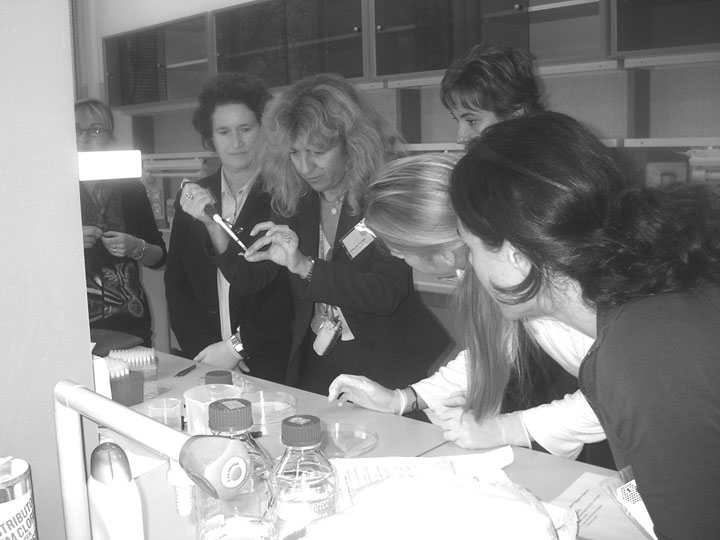ELLS goes to Italy

In 2004, ELLS travelled south to forge sustainable links between teachers and research institutions in Italy. Our first port of call was Milan.
The idea of organizing a course in Milan started to germinate about one year ago, when Maria Luisa Tenchini, an EMBL alumna who is a Genetics Professor in Milan Medical School, contacted ELLS. Together with the Ufficio Scolastico de la Lombardia, Maria Luisa had already established the CUS-Bio (Centro Università-Scuola per le Bioscienze) bringing together scientists, teachers and students in Milan University. A very successful course “Ingegneria genetica e sue applicazioni” for a group of 150 teachers had already taken place in the spring and Maria Luisa was hoping to organize another course in collaboration with ELLS for the autumn. As part of the collaboration, Silvia Boi, a postdoc-turned teacher, who is now a full-time member of CUS-Bio, spent June at EMBL adapting ELLS’ activities to their needs. CUS-Bio also hired a second full-time member, Cinzia Gracioli, an experienced science teacher particularly skilled in audiovisual technologies applied to teaching.
For three afternoons, 30 Italian teachers participated in the first ELLS-CUS-Bio LearningLAB, “From Organisms to Genes,” following the development of fish embryos, performing fish mutant genotyping by PCR and hunting a protein on the web in a bioinformatics activity. ELLS Education Officer Alexandra Manaia flew in from Heidelberg to lend a hand in the wet labs, and EMBL Computer Scientist Francesca Diella led the bioinformatics activity. But most of the work was carried out by the local team who did a wonderful job: the CUS-Bio staff Silvia and Cinzia, Professors Maria Luisa Tenchini, Paolo Plevani, Giovanna Viale and Franco Cotelli, and Milan University fish experts. CUS-Bio has got off to a strong start with a full schedule of exciting activities for the future, including an e-learning module based on the course “From Organisms to Genes” developed in collaboration with ELLS.
ELLS’ second port of call was EMBL’s Monterotondo Outstation, for a LearningLAB on “Stem Cells: promises and challenges.” Cornelius Gross, who did a brilliant job coordinating the Monterotondo scientists, gave a general overview of the course. Fresh off a flight from Singapore, Nadia Rosenthal, the Outstation Director, gave an outstanding talk on stem cells and their applications. Following protocols carefully selected and adapted by Walter Witke, young EMBL scientists Rossana De Lorenzi, Daniela Ruffell, Carla Sciarretta and Arianna Nenci guided the teachers through exciting hands-on activities. José González and his collaborators demonstrated blastocyst microinjection.
For the closing act, ELLS were very fortunate to benefit from the collaboration of two Branco-Weiss Science-in-Society Fellows: Giuseppe Testa and Giovanni Frazzetto. Giuseppe gave a great talk on bioethical implications of stem cell technologies, followed by a lively role-play game designed by Giovanni. The teachers also had fun playing “The Stem Cell Game,” a board game developed by ELLS.
The Monterotondo team did such a great job and the teachers’ response was so positive that we are all already dreaming of the next Monterotondo LearningLAB!